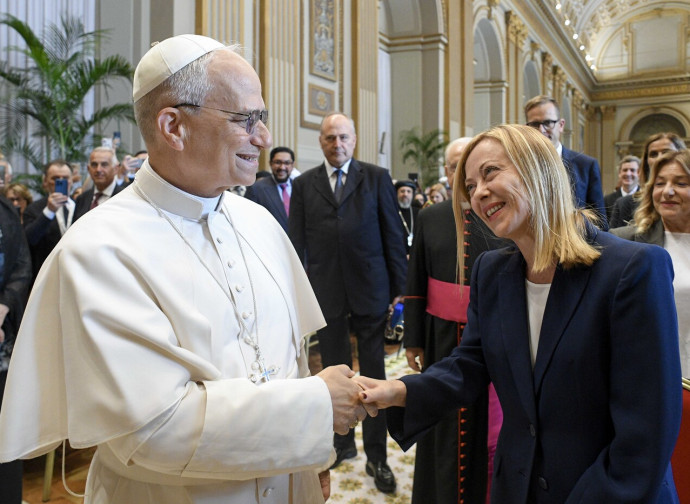With Leo XIV, natural law finally returns
In his address to parliamentarians, the Pope posits natural law as a point of reference for legislating on ethical issues, including those concerning the intimate sphere of personal life. This is an important and necessary return to the teachings of the Church after years of neglect.

Finally, we are returning to natural law. Leo XIV spoke about this again in his address to Parliamentarians on the occasion of the Jubilee of Government Officials (see here) on 21 June. We say ‘returning’ because the principle of natural law had recently been rather neglected by the Magisterium, while for some time now it has even been abandoned or transformed by prevailing theology. We are all interested to see how the Pope will develop the reference to his distant predecessor, from whom he took his name, to his encyclical Rerum novarum and, more generally, to the social doctrine of the Church. In his speeches during this first month of his pontificate, he has already given us some examples, which La Bussola has been quick to point out. This happened, for example, when he recalled the duty of formation in the social doctrine and of understanding the latter as aimed at evangelisation (here). Now it is the case of natural law.
In the above-mentioned speech, Leo XIV spoke of “natural law, not written by human hands, but recognised as universally valid and at all times, which finds its most plausible and convincing form in nature itself”. He then quoted a pre-Christian author, Cicero, who had already seen this law and described it in these words: "Natural law is right reason, conforming to nature, universal, constant and eternal, which by its commands invites us to do what we ought to do, and by its prohibitions deters us from doing what we ought not to do [...]. It is not lawful to make any change in this law, nor to take away any part of it, nor is it possible to abolish it altogether; neither by means of the Senate nor by means of the people can we free ourselves from it, nor is it necessary to seek its commentator or interpreter. And there shall be no law in Rome, none in Athens, none now, none later; but one eternal and unchanging law shall govern all peoples at all times' (Cicero, De re publica, III, 22).
‘Natural law,’ continued the Pope, ‘universally valid beyond and above other more debatable convictions, is the compass by which we orient ourselves in legislating and acting, particularly on delicate ethical issues that today arise in a much more compelling way than in the past, touching the sphere of personal intimacy.’
These are not new ideas, but, as we said, a return to what has always been taught by the Magisterium of the Church. If these observations seem new, it is because we have not heard them for some time.
Human beings have a common knowledge of certain fundamental moral principles that they learn at the very moment their intelligence opens to reality. This, in fact, inclines human thought to grasp a natural and finalistic order that is the source of duties first and rights second. That this law is inscribed “in our hearts”, as is often said, does not mean that it is a feeling; it is, in fact, a knowledge that is the fruit of human intelligence in grasping the order of things. That the law is called “natural” means two things: the first is that man knows it by “connaturality”, that is, by following his intelligent nature; the second is that it is spontaneous and immediate for him – therefore natural in this sense – to know it. For these reasons, Leo XIV considers it “universally valid, plausible and convincing”. All men share its grammar as an expression of common sense knowledge, that knowledge which coincides with or necessarily derives from our intelligence's very first apprehension of reality.
One point deserves attention. In theory, natural law is the heritage of every man's conscience, but in practice it is based on a vision of the capacities of human reason that only true religion can guarantee. In fact, many religions either do not even recognise the possibility of a natural law or interpret it in such a way as to distort it. This establishes a special relationship between the doctrine of natural law and the Catholic religion (we say Catholic and not Christian because there are some problems for Protestants, for example). In other words, given that human nature in its present fallen state does not possess itself fully, natural law needs two supports: that of a reason capable of grasping all reality and that of a religion that sustains and purifies this commitment in difficult moments.
Here we encounter two particular aspects of Leo XIV's intervention. Firstly, in our opinion, it is not certain that the UN Declaration of Human Rights, which he seems to identify with natural law, makes use of the correct conception of human reason or whether it is not also the result of the reductionism of the modern era: a new vision of the person, a certain conventionalism of Lockean origin, uncertainties about the concept of “nature”, and the substantial secularism of the framework.
Secondly, let us reread this passage from the Pope's speech: “In order to have a single point of reference in political action, rather than excluding a priori the consideration of the transcendent in decision-making processes, it will be useful to seek in it what unites us all”. He had just finished speaking about interreligious dialogue. The reference to the transcendent is important – decisive, in some respects – because natural law refers to the unavailability of what is “not written by human hands”, and the natural order of which it is an expression refers us to God. But not to a generic transcendent, but only to the one true God, to use the words of Pope Benedict.
